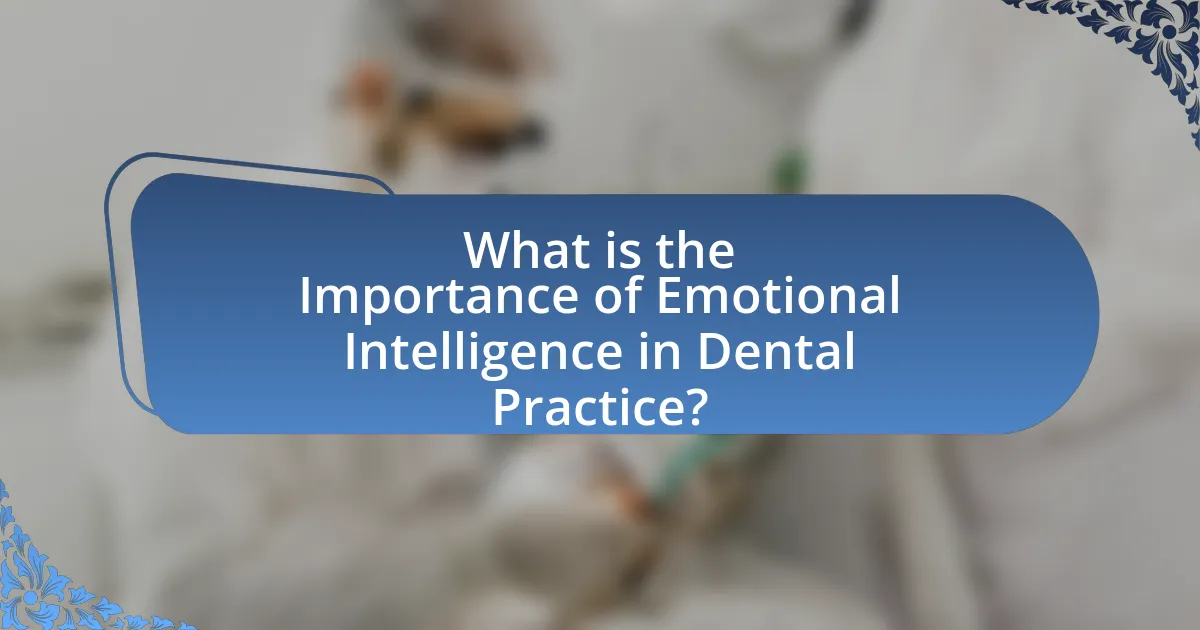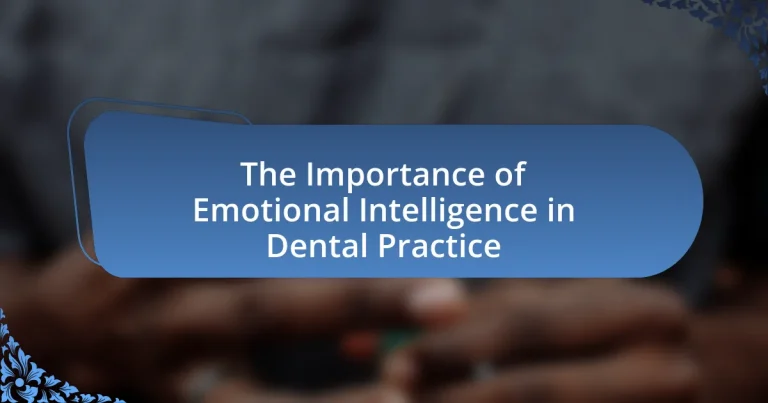Emotional intelligence is a critical component in dental practice, significantly influencing patient interactions and treatment outcomes. This article explores the importance of emotional intelligence in enhancing communication, empathy, and trust between dental professionals and patients, ultimately leading to improved patient satisfaction and compliance with treatment plans. It also examines how emotional intelligence fosters better team dynamics, conflict resolution, and overall practice success, while providing strategies for dental professionals to develop these essential skills through training, self-reflection, and feedback. The findings underscore the long-term benefits of integrating emotional intelligence into dental practice for both patient retention and staff morale.

What is the Importance of Emotional Intelligence in Dental Practice?
Emotional intelligence is crucial in dental practice as it enhances patient interactions and improves overall treatment outcomes. Practitioners with high emotional intelligence can better understand and manage their own emotions, as well as empathize with patients, leading to increased patient satisfaction and trust. Research indicates that effective communication, a key component of emotional intelligence, significantly reduces patient anxiety and improves compliance with treatment plans. For instance, a study published in the Journal of Dental Education found that dental students who received training in emotional intelligence demonstrated better patient rapport and communication skills, ultimately leading to more successful clinical outcomes.
How does emotional intelligence impact patient interactions in dental settings?
Emotional intelligence significantly enhances patient interactions in dental settings by fostering better communication and trust between dental professionals and patients. High emotional intelligence allows dental practitioners to recognize and respond to patients’ emotional states, reducing anxiety and improving overall patient satisfaction. Research indicates that practitioners with strong emotional intelligence skills can effectively manage patient fears and concerns, leading to increased compliance with treatment plans and a more positive dental experience. For instance, a study published in the Journal of Dental Education found that dental students who received training in emotional intelligence demonstrated improved patient rapport and satisfaction scores compared to those who did not receive such training.
What specific emotional intelligence skills are beneficial for dental professionals?
Dental professionals benefit from specific emotional intelligence skills such as empathy, self-regulation, and effective communication. Empathy allows dental professionals to understand and relate to patients’ feelings, which can reduce anxiety and improve patient satisfaction. Self-regulation helps them manage their own emotions, ensuring they remain calm and composed in stressful situations, which is crucial in a clinical environment. Effective communication skills enable dental professionals to convey information clearly and compassionately, fostering trust and rapport with patients. Research indicates that these emotional intelligence skills contribute to better patient outcomes and enhanced professional relationships in healthcare settings.
How can emotional intelligence improve patient satisfaction and trust?
Emotional intelligence can significantly improve patient satisfaction and trust by enhancing communication and empathy between dental professionals and patients. When dental practitioners demonstrate high emotional intelligence, they are better equipped to understand and respond to patients’ emotional needs, leading to a more personalized and supportive care experience. Research indicates that effective communication, which is a key component of emotional intelligence, can increase patient adherence to treatment plans and reduce anxiety, ultimately resulting in higher satisfaction rates. A study published in the Journal of Dental Education found that patients who felt understood and valued by their dentists reported greater trust and were more likely to return for future visits. This correlation underscores the importance of emotional intelligence in fostering a positive patient-provider relationship, thereby enhancing overall patient satisfaction and trust in dental practice.
Why is emotional intelligence crucial for dental team dynamics?
Emotional intelligence is crucial for dental team dynamics because it enhances communication, collaboration, and conflict resolution among team members. High emotional intelligence allows dental professionals to understand and manage their own emotions while also empathizing with colleagues and patients, leading to a more cohesive work environment. Research indicates that teams with high emotional intelligence experience improved performance and job satisfaction, as they can navigate interpersonal relationships effectively. For instance, a study published in the Journal of Dental Education found that dental students with higher emotional intelligence demonstrated better teamwork skills and patient interactions, underscoring the importance of emotional intelligence in fostering a positive and productive dental practice.
How does emotional intelligence contribute to effective communication among team members?
Emotional intelligence enhances effective communication among team members by enabling individuals to recognize, understand, and manage their own emotions as well as those of others. This skill fosters empathy, which is crucial in a dental practice where team members must collaborate closely and respond to patients’ emotional needs. Research indicates that teams with high emotional intelligence experience improved collaboration and conflict resolution, leading to better patient care outcomes. For instance, a study published in the Journal of Dental Education found that dental students with higher emotional intelligence scores demonstrated superior communication skills and teamwork, directly impacting their clinical performance.
What role does emotional intelligence play in conflict resolution within a dental practice?
Emotional intelligence plays a crucial role in conflict resolution within a dental practice by enabling staff to understand and manage their own emotions as well as those of others. This understanding fosters effective communication, allowing dental professionals to address misunderstandings and disagreements constructively. Research indicates that high emotional intelligence correlates with improved teamwork and patient satisfaction, which are essential in a dental setting. For instance, a study published in the Journal of Dental Education found that dental students with higher emotional intelligence demonstrated better conflict management skills, leading to more harmonious work environments and enhanced patient care.
What are the long-term benefits of fostering emotional intelligence in dental practice?
Fostering emotional intelligence in dental practice leads to improved patient relationships, enhanced team collaboration, and increased job satisfaction among staff. These benefits contribute to a more positive work environment and better patient outcomes. Research indicates that practices with high emotional intelligence experience lower turnover rates and higher patient retention, as emotionally intelligent practitioners can effectively manage stress and communicate empathetically. A study published in the Journal of Dental Education found that dental students who received training in emotional intelligence demonstrated better patient interaction skills, which are crucial for long-term success in practice.
How can emotional intelligence lead to better patient retention rates?
Emotional intelligence can lead to better patient retention rates by enhancing the quality of patient-provider interactions. When dental professionals exhibit high emotional intelligence, they are better equipped to understand and respond to patients’ emotional needs, fostering trust and rapport. Research indicates that practices with emotionally intelligent staff report higher patient satisfaction, which correlates with increased loyalty and retention. For instance, a study published in the Journal of Healthcare Management found that effective communication and empathy, key components of emotional intelligence, significantly improve patient experiences, leading to a 20% increase in retention rates.
What impact does emotional intelligence have on the overall success of a dental practice?
Emotional intelligence significantly enhances the overall success of a dental practice by improving patient relationships and team dynamics. High emotional intelligence enables dental professionals to better understand and manage their own emotions, as well as empathize with patients, leading to increased patient satisfaction and loyalty. Research indicates that practices with emotionally intelligent staff experience higher patient retention rates, as patients feel more valued and understood. Additionally, effective communication and conflict resolution among team members foster a positive work environment, which can lead to improved staff morale and productivity. This correlation between emotional intelligence and practice success is supported by studies showing that practices with higher emotional intelligence scores report better financial performance and patient outcomes.
How can dental professionals develop their emotional intelligence?
Dental professionals can develop their emotional intelligence by engaging in self-reflection, seeking feedback, and participating in training programs focused on emotional skills. Self-reflection allows dental professionals to assess their emotional responses and understand their impact on patient interactions. Seeking feedback from colleagues and patients provides insights into how their emotional expressions are perceived, fostering growth. Additionally, training programs that emphasize empathy, communication, and conflict resolution can enhance emotional intelligence, as studies show that structured training improves interpersonal skills in healthcare settings. For instance, a study published in the Journal of Dental Education found that emotional intelligence training significantly improved communication skills among dental students, highlighting the effectiveness of targeted educational interventions.
What training programs are available for enhancing emotional intelligence in dentistry?
Training programs available for enhancing emotional intelligence in dentistry include workshops, online courses, and specialized seminars. These programs often focus on developing skills such as empathy, communication, and conflict resolution, which are crucial for effective patient interactions and team dynamics. For instance, the American Dental Association offers resources and continuing education courses that emphasize emotional intelligence in clinical practice. Additionally, institutions like the University of Southern California provide specific training modules aimed at improving interpersonal skills among dental professionals. These programs are designed to equip dentists with the necessary tools to foster better relationships with patients and colleagues, ultimately leading to improved patient care and workplace satisfaction.
How can self-reflection and feedback improve emotional intelligence skills?
Self-reflection and feedback enhance emotional intelligence skills by fostering self-awareness and promoting adaptive emotional responses. Self-reflection allows individuals to analyze their emotions, behaviors, and interactions, leading to greater understanding of their emotional triggers and responses. Feedback from others provides external perspectives that can highlight blind spots and reinforce positive behaviors. Research indicates that individuals who engage in regular self-reflection and seek feedback demonstrate improved emotional regulation and empathy, which are critical components of emotional intelligence. For instance, a study published in the Journal of Applied Psychology found that self-reflection practices significantly correlated with higher emotional intelligence scores among participants.
What practical strategies can be implemented to enhance emotional intelligence in dental practice?
To enhance emotional intelligence in dental practice, practitioners can implement strategies such as active listening, empathy training, and regular feedback sessions. Active listening involves fully concentrating on the patient’s words, which fosters trust and understanding. Empathy training can be conducted through workshops that teach dental staff to recognize and respond to patients’ emotional states, improving patient interactions. Regular feedback sessions allow team members to discuss emotional challenges and successes, promoting a supportive environment. Research indicates that practices with high emotional intelligence report better patient satisfaction and lower anxiety levels among patients, highlighting the effectiveness of these strategies.
How can regular team-building exercises promote emotional intelligence among staff?
Regular team-building exercises can significantly promote emotional intelligence among staff by fostering communication, collaboration, and empathy. These activities create an environment where employees can practice and enhance their interpersonal skills, which are essential components of emotional intelligence. For instance, team-building exercises often involve problem-solving tasks that require participants to listen actively, express their thoughts clearly, and understand the perspectives of their colleagues. Research indicates that organizations that engage in regular team-building activities report improved emotional awareness and social skills among employees, leading to better workplace relationships and increased job satisfaction.
What role does patient feedback play in developing emotional intelligence in dental professionals?
Patient feedback is crucial in developing emotional intelligence in dental professionals as it provides direct insights into patient experiences and emotional responses. By actively listening to and reflecting on patient feedback, dental professionals can enhance their empathy, self-awareness, and interpersonal skills, which are key components of emotional intelligence. Research indicates that professionals who engage with patient feedback are better equipped to understand and manage their own emotions as well as those of their patients, leading to improved patient satisfaction and care outcomes. For instance, a study published in the Journal of Dental Education found that dental students who received feedback from patients demonstrated significant improvements in their emotional intelligence scores over time.


